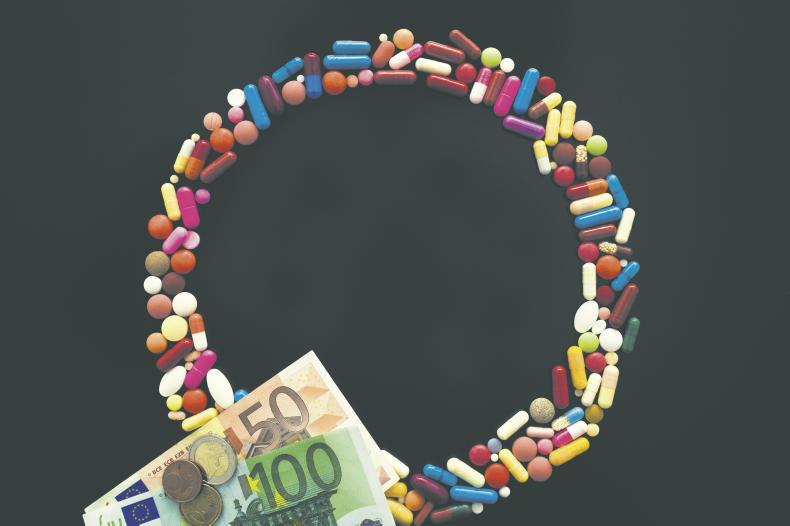Sometimes it can all become too much – experiencing painful and debilitating symptoms, while at the same time trying to find the money to pay for the medication to make you feel better. So what do you do if you are not one of the 2.1m people in this country that holds either a medical card or a GP visit card?
The first thing to do is look at the Long Term Illness (LTI) scheme list.
If you are newly diagnosed with diabetes type II, for example, you’re covered by this scheme. Epilepsy is on the list too. In these cases, all you have to do is pick up what’s prescribed at the pharmacy.
Similarly, if you are diagnosed with multiple sclerosis or Parkinsonism. There are 16 diseases and disabilities covered on the LTI list, including intellectual disability, cerebral palsy, muscular dystrophy, haemophilia and spina bifida, and others.
However, if you have the skin condition psoriasis, or the lung disorder asthma, or the inflammatory bowel condition known as Crohn’s disease, you are not entitled to get the medication you need for free.
What do you do then if finding money to pay for the necessary creams, inhalers or procedures to keep you well is increasingly difficult?
Drugs Payment Scheme Card.
This card is your first option. All Irish residents who don’t have a medical card should apply for this.
Under this scheme a family pays no more than €134/month for prescribed medicines and appliances.
You will need the money in your hand to pay for the full prescription up front though, and you will have to wait a few weeks for it to be refunded by the HSE after you return the refund form.
DISCRETIONARY MEDICAL CARD
However, what if paying €134/month is still too much of a financial burden given your family income? What else can you do?
The next option may be to apply for a Discretionary Medical Card. You have to make your case for this, explaining the undue hardship you are experiencing.
The Discretionary Hardship Scheme, like that for the medical card and GP visit card schemes, is run by the Primary Care Reimbursement Unit (PCRS).
Anne Marie Hoey is assistant national director of this unit.
“If there is a medical condition within a family or experienced by an individual, they can give us the details of expenses associated with the condition,” she says, “and we will take into account everything that the person can provide to us, in addition to a clinical report.
This would be a report from their GP or consultant who understands the condition and the burden of illness that condition imposes on that individual or family.
“All of that is taken into account and then a decision is made in the Medical Card Unit in terms of whether a GP visit card or a medical card can be awarded based on all the information that we have.”
The average review period for a discretionary medical card is three years.
REIMBURSABLE DRUGS LIST
Some drugs that are not included on the Long Term Illness Scheme list may be available free to you if they are on the Reimbursable Drugs List.
The National Centre for Pharmacoeconomics (www.ncpe.ie) is the body that assesses new drugs and makes recommendations to the HSE National Drugs Committee about whether or not the State should pay for these drugs under its various schemes. Monthly updates to this list can be found on its website.
A reader contacted us recently about why one particular dementia drug – Donicept – was available to her family member free and other drugs for dementia that he was prescribed weren’t. The best answer we could get from the PCRS was that only this drug, of the list prescribed for the person, was on the Reimbursable Drugs List.
The rest had to be bought via the Drugs Payment Scheme, with its threshold of €134/month.
HIGH TECH SCHEME
Prescriptions for drugs under this scheme, like biologics (for psoriasis), are usually issued by consultants and dispensed in a pharmacy.
If the person doesn’t have a medical card or LTI card, they will have to pay the first €134/month cost of these high-tech drugs under the Drugs Payments Scheme.
TAX RELIEF ON MEDICINES
Don’t forget that the cost of most prescribed medication can be claimed back against your tax.
Get an annual print-out from your pharmacist and submit with a MED1 form with your tax return.
Remember to claim back the initial amount you spent each month on the Drugs Payment Scheme, ie the €134.
See www.revenue.ie for more information.
ASTHMA AND CROHN’S NOT COVERED BY LTI
Several support groups, including the Asthma Society and the Irish Society for Colitis and Crohn’s disease, are lobbying for inclusion of their chronic condition on the Long Term Illness Scheme list.
“Many people with asthma are paying up to €134/month on their asthma medication before you factor in an additional minimum cost of €150/year on GP visits,” says Kevin Kelly, acting CEO of the Asthma Society.
“This brings the combined total to in excess of €1,700/annum, but many costs are not factored in such as time taken off work to attend GP or hospital appointments, time taken off work due to the illness, transport costs for these visits and prescription charges.
Asthma is a disease that runs in families, so GP and medication costs can sky-rocket.
It is not included in the Long Term Illness Scheme, but no politician has offered up a reason as to why it’s not."
PRIMARY CARE REIMBURSEMENT SCHEME
Ever wonder how the system whereby doctors, pharmacists and opticians get money back for services and medications works?
This is all handled by what’s called the Primary Care Reimbursement Unit. In 2017 the Unit reimbursed 68m items, the majority of which involved medication.
The unit has two main functions, assistant director Anne Marie Hoey says – the national medical card unit, which assesses eligibility for the population for medical cards and GP visit cards and operational responsibility for most of the community schemes, eg the immunisation scheme, the high-tech drugs arrangement, the long-term illness and drug payments, and so on. As well as assessing medical card/GP visit card eligibility, the Unit also pays all the contractors (GPs, pharmacies, dentists and opticians, etc) who provide services to this Unit.
“We have 6,976 contractors at present and our budget for this is €2.6bn, but we also make payments in respect of the high-tech drug arrangement, amounting to around €615m/annum spend at present.”
The Unit’s 370 staff reimbursed 68m items under the various schemes in 2017, mostly medications, she says.
Our budget is about 18% of the HSE’s health vote.
The Unit recently launched its national medical card application online service, making application easier.
“When you get to a certain part of the application you’ll get an indication whether or not you’re likely or unlikely to be eligible based on the information you’ve given,” she says, “but you can still progress with your application and we will process it fully. The whole medical information aspect will then come into consideration.”
THE PROCESS WHEN YOU GET MEDICATION USING A MEDICAL CARD
Your GP is paid an annual capitation fee to manage your care.
If he writes a prescription for you, you bring that to a pharmacy, then the pharmacy submits a claim to the PCRS for payment for those drugs at the end of the month.
Pharmacies apply early in the month for medication dispensed the month before and they get paid in the same month.
WHAT A GP GETS PAID FOR TREATING MEDICAL CARD PATIENTS
Ever wonder what a GP gets paid each year for managing the healthcare of those with medical cards?
As well as receiving subsidies for running a surgery, like paying a nurse and a receptionist,
GMS doctors also receive annual capitation payments for each patient. This is a 2016 list:
Schedule 1 – Services rendered under the General Medical Services Scheme (Capitation Agreement) general practitioner capitation rates:
• Male, under five years of age: €74.59.• Male, aged five to 16: €43.29. • Male, 16-45: €55.26. • Male, 45-65: €110.38. • Male, 65-70: €116.28. • Male/female, aged 70 or over, residing in the community: €271.62. • Male/female, aged 70 or over, more residing in a private nursing home: €434.15 (approved by the HSE) for continuous periods in excess of five weeks. • Female, under five years of age: €72.76. • Female, aged five to 16: €43.79. • Female, 16-45: €90.37. • Female, 45-65: €121.29.• Female, 65-70: €129.72. • Supplementary out-of-hours fee: €3.64. CLINFO BOX
HSE’s Guide to the Long-Term Illness (LTI) Scheme. For full list see www.medicalcard.ie. You can now apply online with supporting documents sent by email. www.pcrs.ie
Read more
Versatis cut: ‘Nobody deserves to live a life in daily agony’
https://www.farmersjournal.ie/one-hundred-years-of-healthier-women-348538
Sometimes it can all become too much – experiencing painful and debilitating symptoms, while at the same time trying to find the money to pay for the medication to make you feel better. So what do you do if you are not one of the 2.1m people in this country that holds either a medical card or a GP visit card?
The first thing to do is look at the Long Term Illness (LTI) scheme list.
If you are newly diagnosed with diabetes type II, for example, you’re covered by this scheme. Epilepsy is on the list too. In these cases, all you have to do is pick up what’s prescribed at the pharmacy.
Similarly, if you are diagnosed with multiple sclerosis or Parkinsonism. There are 16 diseases and disabilities covered on the LTI list, including intellectual disability, cerebral palsy, muscular dystrophy, haemophilia and spina bifida, and others.
However, if you have the skin condition psoriasis, or the lung disorder asthma, or the inflammatory bowel condition known as Crohn’s disease, you are not entitled to get the medication you need for free.
What do you do then if finding money to pay for the necessary creams, inhalers or procedures to keep you well is increasingly difficult?
Drugs Payment Scheme Card.
This card is your first option. All Irish residents who don’t have a medical card should apply for this.
Under this scheme a family pays no more than €134/month for prescribed medicines and appliances.
You will need the money in your hand to pay for the full prescription up front though, and you will have to wait a few weeks for it to be refunded by the HSE after you return the refund form.
DISCRETIONARY MEDICAL CARD
However, what if paying €134/month is still too much of a financial burden given your family income? What else can you do?
The next option may be to apply for a Discretionary Medical Card. You have to make your case for this, explaining the undue hardship you are experiencing.
The Discretionary Hardship Scheme, like that for the medical card and GP visit card schemes, is run by the Primary Care Reimbursement Unit (PCRS).
Anne Marie Hoey is assistant national director of this unit.
“If there is a medical condition within a family or experienced by an individual, they can give us the details of expenses associated with the condition,” she says, “and we will take into account everything that the person can provide to us, in addition to a clinical report.
This would be a report from their GP or consultant who understands the condition and the burden of illness that condition imposes on that individual or family.
“All of that is taken into account and then a decision is made in the Medical Card Unit in terms of whether a GP visit card or a medical card can be awarded based on all the information that we have.”
The average review period for a discretionary medical card is three years.
REIMBURSABLE DRUGS LIST
Some drugs that are not included on the Long Term Illness Scheme list may be available free to you if they are on the Reimbursable Drugs List.
The National Centre for Pharmacoeconomics (www.ncpe.ie) is the body that assesses new drugs and makes recommendations to the HSE National Drugs Committee about whether or not the State should pay for these drugs under its various schemes. Monthly updates to this list can be found on its website.
A reader contacted us recently about why one particular dementia drug – Donicept – was available to her family member free and other drugs for dementia that he was prescribed weren’t. The best answer we could get from the PCRS was that only this drug, of the list prescribed for the person, was on the Reimbursable Drugs List.
The rest had to be bought via the Drugs Payment Scheme, with its threshold of €134/month.
HIGH TECH SCHEME
Prescriptions for drugs under this scheme, like biologics (for psoriasis), are usually issued by consultants and dispensed in a pharmacy.
If the person doesn’t have a medical card or LTI card, they will have to pay the first €134/month cost of these high-tech drugs under the Drugs Payments Scheme.
TAX RELIEF ON MEDICINES
Don’t forget that the cost of most prescribed medication can be claimed back against your tax.
Get an annual print-out from your pharmacist and submit with a MED1 form with your tax return.
Remember to claim back the initial amount you spent each month on the Drugs Payment Scheme, ie the €134.
See www.revenue.ie for more information.
ASTHMA AND CROHN’S NOT COVERED BY LTI
Several support groups, including the Asthma Society and the Irish Society for Colitis and Crohn’s disease, are lobbying for inclusion of their chronic condition on the Long Term Illness Scheme list.
“Many people with asthma are paying up to €134/month on their asthma medication before you factor in an additional minimum cost of €150/year on GP visits,” says Kevin Kelly, acting CEO of the Asthma Society.
“This brings the combined total to in excess of €1,700/annum, but many costs are not factored in such as time taken off work to attend GP or hospital appointments, time taken off work due to the illness, transport costs for these visits and prescription charges.
Asthma is a disease that runs in families, so GP and medication costs can sky-rocket.
It is not included in the Long Term Illness Scheme, but no politician has offered up a reason as to why it’s not."
PRIMARY CARE REIMBURSEMENT SCHEME
Ever wonder how the system whereby doctors, pharmacists and opticians get money back for services and medications works?
This is all handled by what’s called the Primary Care Reimbursement Unit. In 2017 the Unit reimbursed 68m items, the majority of which involved medication.
The unit has two main functions, assistant director Anne Marie Hoey says – the national medical card unit, which assesses eligibility for the population for medical cards and GP visit cards and operational responsibility for most of the community schemes, eg the immunisation scheme, the high-tech drugs arrangement, the long-term illness and drug payments, and so on. As well as assessing medical card/GP visit card eligibility, the Unit also pays all the contractors (GPs, pharmacies, dentists and opticians, etc) who provide services to this Unit.
“We have 6,976 contractors at present and our budget for this is €2.6bn, but we also make payments in respect of the high-tech drug arrangement, amounting to around €615m/annum spend at present.”
The Unit’s 370 staff reimbursed 68m items under the various schemes in 2017, mostly medications, she says.
Our budget is about 18% of the HSE’s health vote.
The Unit recently launched its national medical card application online service, making application easier.
“When you get to a certain part of the application you’ll get an indication whether or not you’re likely or unlikely to be eligible based on the information you’ve given,” she says, “but you can still progress with your application and we will process it fully. The whole medical information aspect will then come into consideration.”
THE PROCESS WHEN YOU GET MEDICATION USING A MEDICAL CARD
Your GP is paid an annual capitation fee to manage your care.
If he writes a prescription for you, you bring that to a pharmacy, then the pharmacy submits a claim to the PCRS for payment for those drugs at the end of the month.
Pharmacies apply early in the month for medication dispensed the month before and they get paid in the same month.
WHAT A GP GETS PAID FOR TREATING MEDICAL CARD PATIENTS
Ever wonder what a GP gets paid each year for managing the healthcare of those with medical cards?
As well as receiving subsidies for running a surgery, like paying a nurse and a receptionist,
GMS doctors also receive annual capitation payments for each patient. This is a 2016 list:
Schedule 1 – Services rendered under the General Medical Services Scheme (Capitation Agreement) general practitioner capitation rates:
• Male, under five years of age: €74.59.• Male, aged five to 16: €43.29. • Male, 16-45: €55.26. • Male, 45-65: €110.38. • Male, 65-70: €116.28. • Male/female, aged 70 or over, residing in the community: €271.62. • Male/female, aged 70 or over, more residing in a private nursing home: €434.15 (approved by the HSE) for continuous periods in excess of five weeks. • Female, under five years of age: €72.76. • Female, aged five to 16: €43.79. • Female, 16-45: €90.37. • Female, 45-65: €121.29.• Female, 65-70: €129.72. • Supplementary out-of-hours fee: €3.64. CLINFO BOX
HSE’s Guide to the Long-Term Illness (LTI) Scheme. For full list see www.medicalcard.ie. You can now apply online with supporting documents sent by email. www.pcrs.ie
Read more
Versatis cut: ‘Nobody deserves to live a life in daily agony’
https://www.farmersjournal.ie/one-hundred-years-of-healthier-women-348538









SHARING OPTIONS